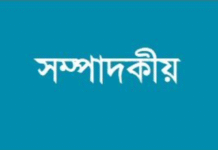Following a preliminary investigation published in 2019, the EU DisinfoLab uncovered a massive operation targeting international institutions and serving Indian interests. “Indian Chronicles” – the name we gave to this operation – resurrected dead media, dead think-tanks and NGOs. It even resurrected dead people. This network is active in Brussels and Geneva in producing and amplifying content to undermine – primarily – Pakistan.
You can read the summary of our investigation as well as our full report by clicking on the links below
The present study reopens and builds upon our previous work, which is documented in our report “Influencing policymakers with fake media outlets, an investigation into a pro-Indian influence network”. We encourage readers to consult the first investigation before diving into this one.
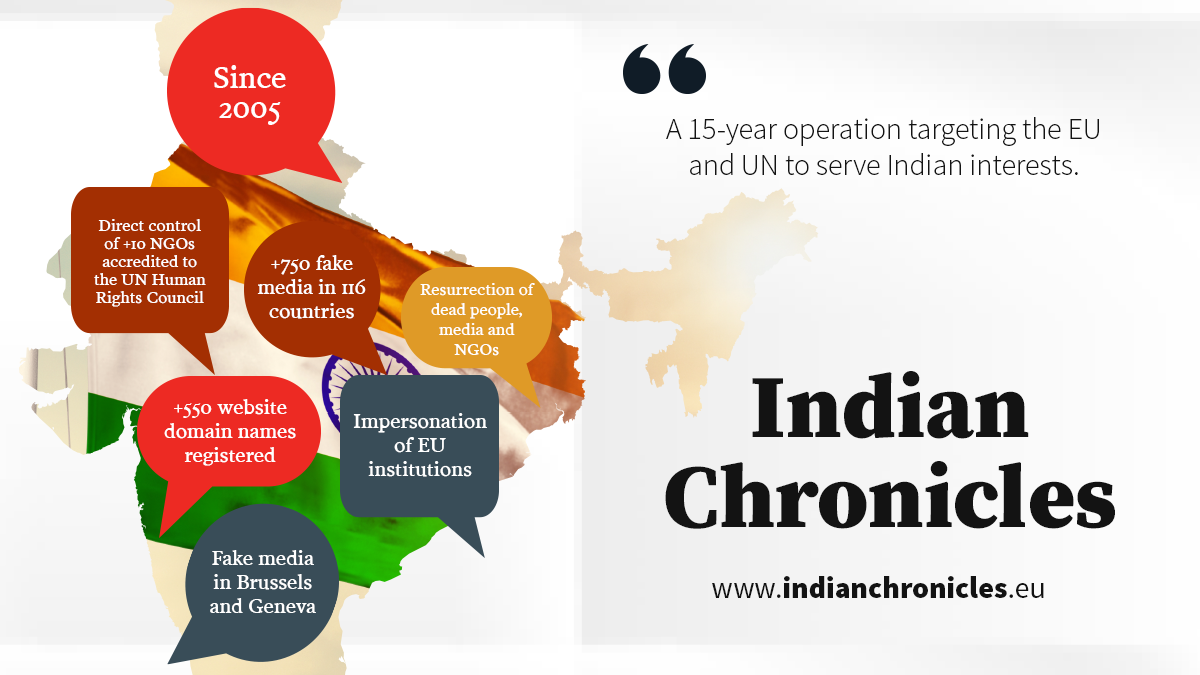
Key facts
In a nutshell, Indian Chronicles is:
- a 15 year-long operation running since 2005;
- 10+ UN Human Rights Council accredited NGOs, mostly resurrected;
- The resurrection of Prof. Louis B. Sohn, a prominent figure in human rights, deceased in 2006;
- Several identity thefts, including the name of Martin Schulz, former president of the European Parliament or the photo of James Purnell, a former UK Government minister;
- 750+ fake media outlets, covering 119 countries;
- 550+ domain names registered.
Summary of the 15-year influence operation
Our open-source investigation shows that the operation led by the Srivastava Group and amplified by ANI began in 2005 and is still ongoing at this date.
The operation’s mission is to discredit nations in conflict with India in Asia, in particular Pakistan but also China to a lesser extent. Its long-term objective is:
- In India, to reinforce pro-Indian and anti-Pakistan (and anti-Chinese) feelings.
- Internationally, to consolidate the power and improve the perception of India, to damage the reputation of other countries and ultimately benefit from more support from international institutions such as the EU and the UN.
To do so, the operation consists of:
- The support to minority and human rights NGOs and think-tanks.
- The use of Members of the European Parliament to create a mirage of institutional support from European institutions to these minority groups, in favour of Indian interests and against Pakistan (and China).
- An active presence in Geneva and the United Nations’ Human Rights Council through:
- side-events and demonstrations in support of minority rights;
- impersonation of extinguished UN-accredited NGOs or use speaking slots reserved to various NGOs whose original missions seem totally unrelated.
- The creation of fake media in Brussels, Geneva and across the world and/or the repackaging and dissemination via ANI and obscure local media networks – at least in 97 countries – to multiply the repetition of online negative content about countries in conflict with India, in particular Pakistan.
Indian Chronicles: Case reopened
During our previous investigation, we decided to leave some of the websites, domain names and associated email addresses that deserved a closer look for later. Over the last months, we took a deeper dive, with a specific focus on the Commission to Study the Organization of Peace (CSOP).
We soon realised that this US-based NGO – accredited to the United Nations Economic and Social Council (ECOSOC) – had become inactive in the late 1970s before being resurrected in 2005. Its identity had been hijacked by the same actors depicted in our first investigation. Shockingly, we discovered that the organisation had not only been revived. Its former Chairman and “grandfather of international law in the US”, Louis B. Sohn, who passed away in 2006, seemingly attended a UN Human Rights Council meeting in 2007 and participated in an event organised by “Friends of Gilgit-Baltistan” in Washington D.C. in 2011.
Advocacy in Geneva: outside and inside the United Nations Human Rights Council
From then on, we uncovered an entire network of coordinated UN-accredited NGOs promoting Indian interests and criticizing Pakistan repeatedly. We could tie at least 10 of them directly to the Srivastava family, with several other dubious NGOs pushing the same messages.
These UN-accredited NGOs work in coordination with non-accredited think-tanks and minority-rights NGOs in Brussels and Geneva. Several of them – like the European Organization for Pakistani Minorities (EOPM), Baluchistan House and the South Asia Democratic Forum (SADF) – were directly but opaquely created by the Srivastava group. In Geneva, these think-tanks and NGOs are in charge of lobbying, organising demonstrations and speaking during press conferences and UN side-events. They were repeatedly given the floor at the UN on behalf of the accredited organisations.

Resurrection of UN-accredited NGOs and the hijacking of causes
Our investigation led to the finding of 10 UN-accredited NGOs directly controlled by the Srivastava Group, which our full report introduces at length. Their common trait? The fact that they all rose from the ashes of real NGOs. Indian Chronicles effectively benefited from the track record of these organisations while pursuing their own agenda: discrediting Pakistan and promoting Indian interests at UN conferences and hearings.
As we looked into the history of these NGOs, it quickly became clear that the topics and issues at their very heart are not much of a concern for Indian Chronicles. The operation takes just about any defunct NGO it can find and revives it to promote Indian interests. Examples include organisations defending peace, protecting the environment or even… promoting canned food.
Before it ceased to exist in 2007, the Canners International Permanent Committee (CIPC) was all about the canning industry. Its reincarnation does not seem so concerned with food anymore: It mostly dispatches Geneva-based students to the UN to talk about Pakistan, and even organised side events on human rights at the UN.
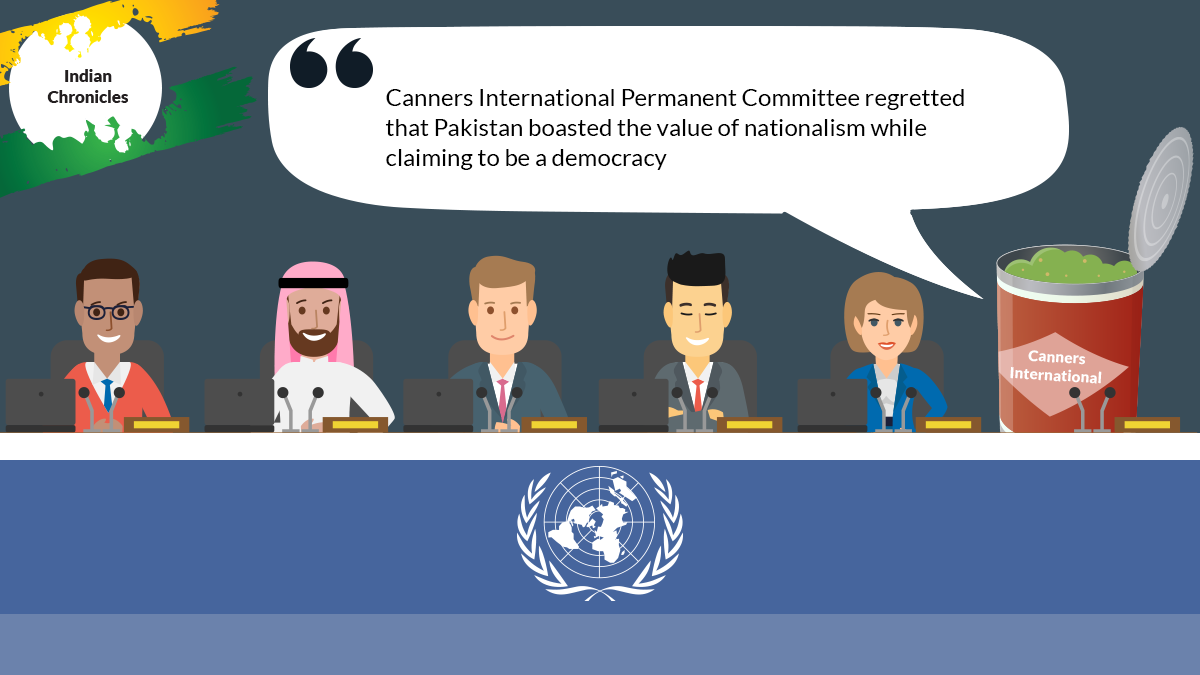
Lobbying in Brussels: Using Members of the European Parliament through an online EU affairs honeypot
The organisations created by the Srivastava Group in Brussels organised trips for Members of the European Parliament (MEPs) to Kashmir, Bangladesh and the Maldives. Some of these trips led to much institutional controversy, as the delegations of MEPs were often presented as official EU delegations when they were in fact not travelling on behalf of the Parliament.
The actors orchestrating Indian Chronicles are directly tied – and again not at all transparently – to the creation of three informal groups in the European Parliament, namely the “South Asia Peace Forum”, the “Baloch Forum” and “Friends of Gilgit-Baltistan”. They have organised press conferences and events within and in front of the European Parliament.
Organisations like WESTT – the Women Economic and Social Think-Tank – have drafted and suggested parliamentary questions to the European Commission, along with articles for fake EU magazines such as EP Today. These served as a honeypot to attract a growing number of MEPs into a pro-India and anti-Pakistan discourse, often using causes such as minorities rights and women’s rights as an entry point.
This is how we uncovered EU Chronicle – the new “EP Today”. A new fake media with fake journalists supposedly covering European affairs, yet essentially providing a platform for MEPs to sign pro-Indian articles. In less than 6 months of existence, already 11 MEPs have written or endorsed op-eds at a remarkably high pace for EU Chronicle.
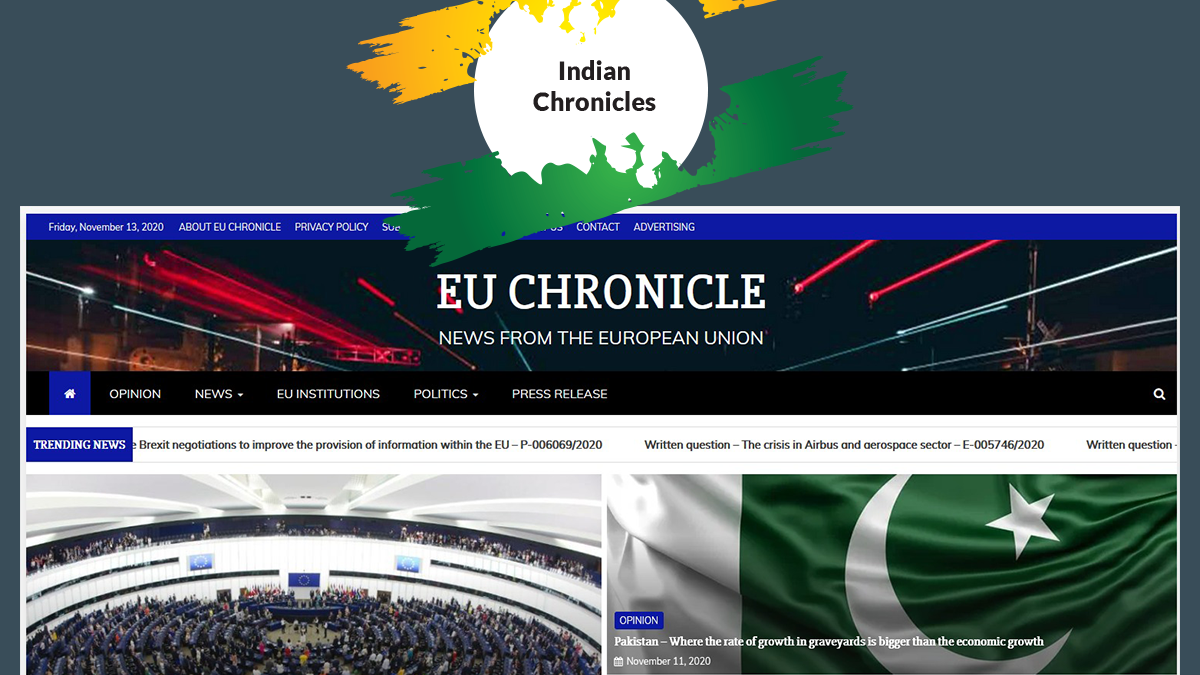
The role of ANI: Repackaging and amplifying the content produced in Brussels & Geneva
Back to EU Chronicle. The only valuable coverage these op-eds receive, comes from an immediate repackaging by an Indian press agency named ANI (Asian News International), often quoting these op-eds as genuine articles from “independent media EU Chronicle”. Without Times of Geneva and 4 News Agency which stopped their activities following our previous investigation, ANI – which is considered as one of the biggest news agencies in India and the largest television agency of India – remains the only press agency to extensively cover the activities of dubious NGOs in Geneva.
The coverage – and often distortion – by ANI of the content produced in Brussels and Geneva led us to the Big News Network and the World News Network – an entire network of 500+ fake local media in 95 countries that have helped reproduce negative iterations about Pakistan (or China). We also realised that the content produced was primarily targeted at Indian nationals, with an extensive coverage of these barely known “media”, MEPs and “NGOs” in Europe.
Essentially, our investigation details how the activities of a fake zombie-NGO and that of a fake specialised media can be repackaged, distorted and amplified by malicious actors to influence or disinform globally, using loopholes in international institutions and online search engines.
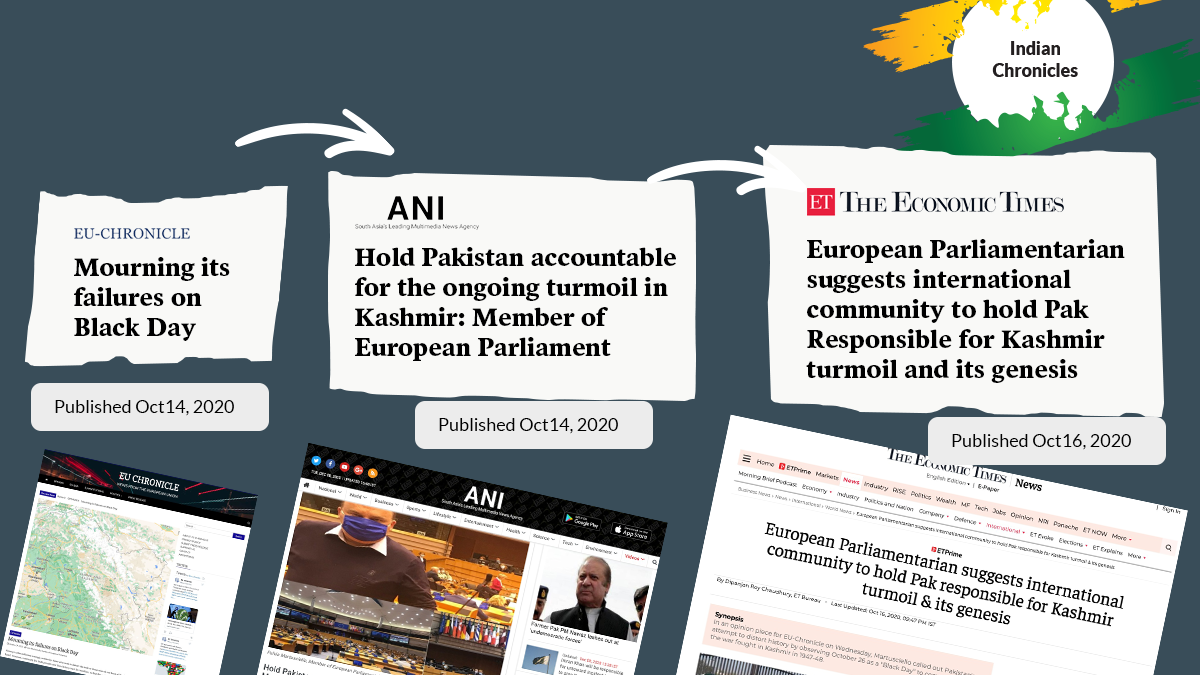
Indian Chronicles and EP Today: the same modus operandi
As in our first investigation, we could observe these patterns:
- Extensive use of student interns, here speaking at the United Nations on behalf of one or more of these NGOs;
- Resurrection of shuttered organisations (NGOs, media) and deceased persons (Louis B. Sohn);
- Use of Regus virtual office addresses or simply fake addresses whenever an address was needed;
- Misleading representation of the views of individual MEPs as general support or official position from the European Union;
- Maximisation of negative content about Pakistan online, primarily using a network of fake local media across the world.
The actors behind EP Today and EU Chronicle registered 550+ domain names of NGOs, think-tanks, media, European Parliament informal groups, religious and Imam organizations, obscure publishing companies and public personalities. A non-negligeable proportion of domain names were bought in the context of the cyberwarfare with Pakistan, to cybersquat on domains that Pakistan might later wish to use.
Every researcher working on disinformation is confronted by the issue of measuring the impact of a disinformation campaign. Indian Chronicles’ 15-year operation certainly does not disappoint in this regard. It has supported:
- Several demonstrations in Brussels and Geneva;
- The display of “free Baluchistan” posters across Geneva;
- The organisation of several events inside the European Parliament;
- The creation of support groups within the European Parliament;
- The influencing of European and International policy making;
- The convocation of the Swiss ambassador in Pakistan by the Pakistani government;
- The trips of delegations of Members of the European Parliament to Bangladesh, the Maldives and Kashmir that led to much controversy in Brussels.

Policy recommendations
We are alarmed to see the continuation of Indian Chronicles which – despite our first report and wide press coverage – has pursued its 15-year long operation and even recently launched EU Chronicle, a fake EU outlet. This should serve as a call to action for decision-makers to put in place a relevant framework to sanction actors abusing our international institutions. It is possible that the absence of messages from the institutions affected by Indian Chronicles provided the space and opportunity for the operation to reinvent itself and to continue doing “more of the same”.
It is also our belief that the possibility for malicious actors to abuse search engines by reproducing the same content hundreds of times should also be challenged.
Our investigation relied heavily on the analysis of websites and domain names, rather than online platforms. Much of what we uncovered could be found thanks to website domain names registration history and because many websites of Indian Chronicles were created at a time when malicious actors were less concerned with privacy. Nowadays, malicious actors register domain names and create websites anonymously, making detection more difficult. The regulatory discussion on data transparency from platforms now taking place should be broadened to include greater scrutiny of domain names. Domain name information is critical for disinformation researchers; we therefore advocate for sufficient transparency for researchers investigating malicious domains. We also urge the domain name industry to seriously reflect on this kind of fraudulent, disinforming behaviour as technical abuse of the domain name system.
About our drive
Every investigation sees disinformation researchers faced with similar questions: Why did you work on disinformation from this and not that country? Are you funded by the enemy of my country? Do you realise that when investigating this matter, you are considering only one side of disinformation? Why don’t you study the other side?
The fact is, we never intended to work on South-Asia related matters. It all began when we read a publication by the European External Action Service (EEAS) about EP Today syndicating content from RT. And this led us to publish these two investigations.
Keeping the record straight
We are well aware – as it is the case for every investigation – that our work will be used and recuperated by those who have an interest in seeing it published. In this case, probably Pakistani authorities.
Let us bear in mind that it is not because one side uses dodgy influence campaigns that the other side does not: A simple Google search will lead you to read about inauthentic behaviours supporting Pakistani interests.
More importantly, our investigation is in no way a judgement of the situation of human rights in Pakistan, nor should it serve to undermine the credibility of minority movements in Pakistan. Our report simply shines a light on how Indian stakeholders have used these issues to serve their own interests. We are convinced that “there is no such thing as good disinformation”, and we would agree with a key actor of Indian Chronicles – namely Madi Sharma – who recently tweeted: “Your ethical muscle grows stronger every time you choose right over wrong.”


